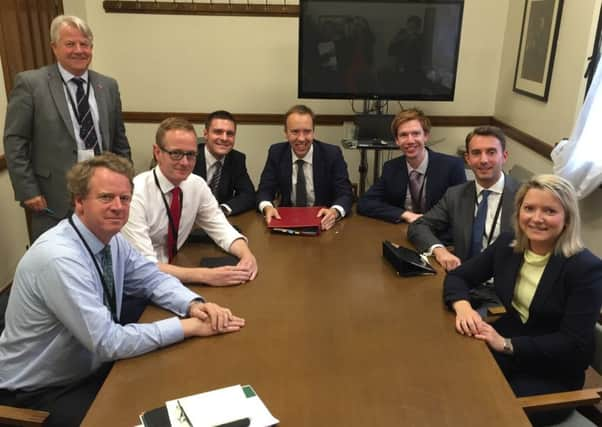Broadband report highlights need for speed in Borders


A new report from the UK Government’s Scottish affairs committee expresses fears that the region and the rest of rural Scotland are being left behind as cities and larger towns enjoy ever-faster internet speeds.
The report, titled Digital Connectivity in Scotland, report is the result of a seven-month inquiry into broadband and mobile phone coverage.
Advertisement
Hide AdAdvertisement
Hide AdIt concludes that decent broadband is an essential utility and calls for stronger consumer rights and better government initiatives to connect more hard-to-reach areas.
Community councils, businesses and residents from all over the Borders wrote to the committee to highlight their broadband issues after being urged by Berwickshire, Roxburgh and Selkirk MP John Lamont to have their say.
The report notes the huge gap between urban and rural Scotland in terms of superfast broadband coverage, with the latest figures showing that only 56% of premises in rural areas have it, compared to 94% in towns and cities.
The report makes a series of recommendations, including banning providers from using the term fibre broadband when they are, in fact, using copper technology connected to a fibre cabinet and creating an automatic right to compensation in areas where there is only one service provider and speeds fall below minimum guaranteed levels.
Advertisement
Hide AdAdvertisement
Hide AdMr Lamont, vice-chairman of the committee, said: “The evidence the committee received from the Borders was really useful. In particular, it revealed the huge difference between the speeds broadband providers are telling customers they will get and what ends up being the reality.
“That is why the committee has recommended tougher rules for broadband providers, including automatic compensation and a stricter definition of what can be called a fibre connection.
“I continue to be contacted by constituents unhappy with their broadband.
“Residents in the Borders are sick of reading about superfast broadband being delivered in the central belt when more than 10,000 properties in the Borders are still waiting for a decent connection.
Advertisement
Hide AdAdvertisement
Hide Ad“There is also clearly a large amount of disagreement between Scotland’s two governments on this issue. This report is right to call for this to be set aside and for Westminster and Holyrood to work together to deliver better broadband for all.”
One of Mr Lamont’s predecessors, Lord Steel of Aikwood, is also calling for better broadband for the Borders.
The peer, an MP for the region from 1965 to 1997 as David Steel, last week asked Lord Ashton of Hyde, a junior minister at the Department for Culture, Media and Sport, during a debate on broadband coverage: “What does the minister have to say to people in my former constituency – in, for example, the Ettrick and Yarrow valleys – who, far from waiting for fibre broadband, cannot even get email services at present?
“Surely the Government should be concentrating on that as well as the future.”
Advertisement
Hide AdAdvertisement
Hide AdAbout a third of the evidence presented to the Scottish affairs committee related to the Borders, and among the community councils flagging up issues were those for Oxton and Channelkirk; Floors, Makerstoun, Smailholm and Nenthorn; Gordon and Westruther; Ettrick and Yarrow; and Southdean.
Residents of Ednam, Roberton, Redpath, Kirk Yetholm and Lauder also wrote in to complain about their poor broadband connections.